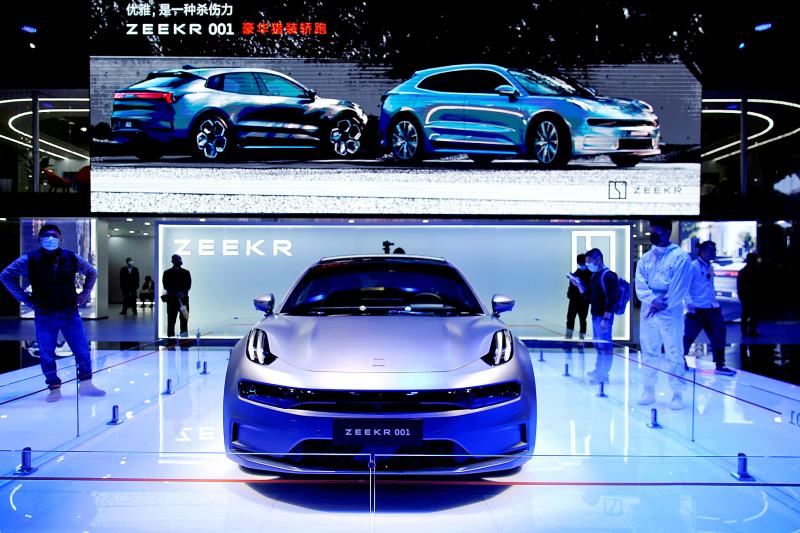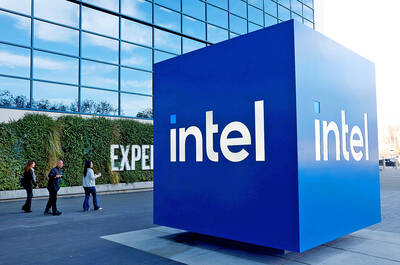China is to end subsidies for electric and hybrid vehicles at the end of the year, authorities have announced, saying the strength of sales in the sector meant state support was no longer needed.
Purchase subsidies would be reduced by 30 percent from the beginning of this year before being scrapped completely by the end of the year, the Chinese Ministry of Finance said in a statement on Friday.
“Given the growth of the industry for vehicles with new energy, the sales trends and the smooth transition of manufacturers, the subsidies ... will end on December 31,” the ministry said. “Vehicles registered after December 31, 2022, will not be subsidized.”

Photo: Reuters
Sales of electric and hybrid vehicles have boomed in China, with annual increases of more than 100 percent in the past few months.
The vehicles are set to represent 18 percent of all vehicle sales this year, the China Association of Automobile Manufacturers (CAAM) estimated last week.
In 2019, they accounted for only 5 percent.
Of the 27.5 million vehicles set to be sold this year, 5 million would be electric and hybrids, CAAM said.
Overall growth in the world’s largest market for vehicles would likely come in at 3.1 percent for last year — the first year of sales growth since 2018, the association said.
China, the world’s largest polluter, has set ambitious goals for the widespread adoption of electric and hybrid vehicles, and aims to have the majority of vehicles powered with clean energy by 2035.

Sweeping policy changes under US Secretary of Health and Human Services Robert F. Kennedy Jr are having a chilling effect on vaccine makers as anti-vaccine rhetoric has turned into concrete changes in inoculation schedules and recommendations, investors and executives said. The administration of US President Donald Trump has in the past year upended vaccine recommendations, with the country last month ending its longstanding guidance that all children receive inoculations against flu, hepatitis A and other diseases. The unprecedented changes have led to diminished vaccine usage, hurt the investment case for some biotechs, and created a drag that would likely dent revenues and

Global semiconductor stocks advanced yesterday, as comments by Nvidia Corp chief executive officer Jensen Huang (黃仁勳) at Davos, Switzerland, helped reinforce investor enthusiasm for artificial intelligence (AI). Samsung Electronics Co gained as much as 5 percent to an all-time high, helping drive South Korea’s benchmark KOSPI above 5,000 for the first time. That came after the Philadelphia Semiconductor Index rose more than 3 percent to a fresh record on Wednesday, with a boost from Nvidia. The gains came amid broad risk-on trade after US President Donald Trump withdrew his threat of tariffs on some European nations over backing for Greenland. Huang further

HSBC Bank Taiwan Ltd (匯豐台灣商銀) and the Taiwan High Prosecutors Office recently signed a memorandum of understanding (MOU) to enhance cooperation on the suspicious transaction analysis mechanism. This landmark agreement makes HSBC the first foreign bank in Taiwan to establish such a partnership with the High Prosecutors Office, underscoring its commitment to active anti-fraud initiatives, financial inclusion, and the “Treating Customers Fairly” principle. Through this deep public-private collaboration, both parties aim to co-create a secure financial ecosystem via early warning detection and precise fraud prevention technologies. At the signing ceremony, HSBC Taiwan CEO and head of banking Adam Chen (陳志堅)

Intel Corp shares plunged as much as 14 percent in late trading after chief executive officer Lip-Bu Tan (陳立武) gave a lackluster forecast and warned that the chipmaker was struggling with manufacturing problems. First-quarter projections for revenue and earnings fell well short of Wall Street estimates and a conference call with analysts, in which Tan said it would take “time and resolve” to turn around the company, sent the shares down further. Production snags have hampered the comeback bid, a disappointment for investors who anticipated more of a boost from new products. “We are on the multiyear journey,” Tan said. Intel, the largest maker